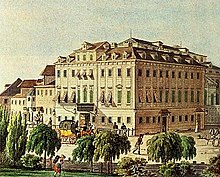Beethoven concert of 22 December 1808
Musicians could not give academies in the summer, when the nobility fled the dust and heat of Vienna to their country estates, and during the fall and winter the theaters were given over to rehearsals and performances of operas, the high status form of musical production."[3] It had opened to rave reviews in 1801; for instance, the Allgemeine musikalische Zeitung called it the "most comfortable and satisfactory in the whole of Germany" (which meant at the time, "all German-speaking lands").Beethoven had lobbied for a private benefit concert for many months—in return for his participation in the charity concerts—and expressed frustration at what he perceived to be Hartl's procrastination on the matter.Another symphony, or at the very least the finale of one, usually closed the concert.Thus it is possible that the difficulty of the concert for listeners may have arisen from the need to take in a whole series of complex and original works (see critical reactions below), as well as the cold.In principle, he had access to the professional orchestra of the Theater an der Wien,[11] but many of its members had a conflicting engagement: the Tonkünstler-Societät, a benevolent society for the widows and orphans of musicians, was putting on one of its four annual oratorio performances at the Burgtheater.Ignaz von Seyfried later wrote: When the master brought out his orchestral Fantasia with choruses, he arranged with me at the somewhat hurried rehearsal, with wet[21] voice-parts as usual, that the second variation should be played without repeat.But he readily and heartily begged the pardon of the orchestra for the humiliation to which he had subjected it, and was honest enough to spread the story himself and assume all responsibility for his own absence of mind.In this troubled venture Beethoven did enjoy the advantage that many in the audience were enthusiasts for his music and eager to attend.He later wrote (in his Personal Letters Written on a Trip to Vienna, 1810):[23] [25 December 1808] The past week, during which the theaters were closed, the evenings filled with public concerts and musical performances, causes me no little embarrassment in my ardent resolve to hear everything.[14] Reichardt goes on to say:[23] There we sat, in the most bitter cold, from half past six until half past ten, and confirmed for ourselves the maxim that one may easily have too much of a good thing, still more of a powerful one.Reichardt's opinion echoed that of the Allgemeine musikalische Zeitung:[24] To judge all these pieces after one and only hearing, especially considering the language of Beethoven's works, in that so many were performed one after the other, and that most of them are so grand and long, is downright impossible.The concert provoked the ire of fellow composer Antonio Salieri, who had been Beethoven's teacher.





1804–05 Beethoven portraitJ. W. MählerTheater an der WienSymphony No. 6Ah! perfidoMass in C majorPiano Concerto No. 4Symphony No. 5Choral Fantasybenefit concertLudwig van BeethovenViennaFourth Piano ConcertoGermanBarry CooperguldenAdventBurgtheaterKärntnertortheaterAllgemeine musikalische ZeitungWiener Zeitunghis operaThird SymphonyKreutzer SonataFideliointermissionEisenstadtPrince EsterházyTonkünstler-SocietätLobkowitz family museumPragueAnna MilderIgnaz SchuppanzighIgnaz von SeyfriedConcertmasterAnton WranitzkyJoseph Franz von LobkowitzJohann Friedrich ReichardtPrince von LobkowitzAntonio SalieriJosef LanzedelliThayerNew Jersey Symphony OrchestraBaltimore Symphony OrchestraRoyal Scottish National OrchestraMostly Mozart FestivalVienna Radio Symphony OrchestraLanaudièreMelbourne Symphony OrchestraSan Francisco SymphonyBBC Scottish Symphony OrchestraRoyal Northern SinfoniaUniversity of the PacificVienna SymphonyWelsh National OperaBBC National Orchestra of WalesCincinnati Symphony OrchestraPhilharmonia OrchestraPeter BranscombeDavid J. BuchGrove's Dictionary of Music and MusiciansIl ritorno di TobiaJoseph HaydnSigismund NeukommNational Public RadioBBC Radio 3William Oliver StrunkLeo TreitlerRoss, AlexThe New YorkerThe Milwaukee SentinelThe Baltimore SunThe Daily TelegraphOestreich, R.The New York TimesABC Classic FMEarly MusicCooper, BarryJones, David WynThayer, Alexander WheelockElliot ForbesList of compositionsBirthplaceRelationship with contemporariesMozartHeiligenstadt TestamentImmortal BelovedRelationship with C minorCollected editionMusical styleCompositional methodWorks catalogsBiamonti CatalogueBeethoven HallBeethovenhalleBeethoven HouseList of sculpturesBerlinMexico CityNew York and San FranciscoMähler's portraitsBeethoven with the Manuscript of the Missa SolemnisEroicaCopying BeethovenOther filmsJohannKasparLudwigJohanna1815 BeethovenBirthplace of Beethoven's motherBeethoven PeninsulaBeethoven quadrangleBeethoven craterBeethoven BurstBeethoven FriezeBeethoven Project TrioBeethoven Quartet SocietyBritish première of Symphony No. 9Eroica PeninsulaIra F. Brilliant Center for Beethoven StudiesThree Bs